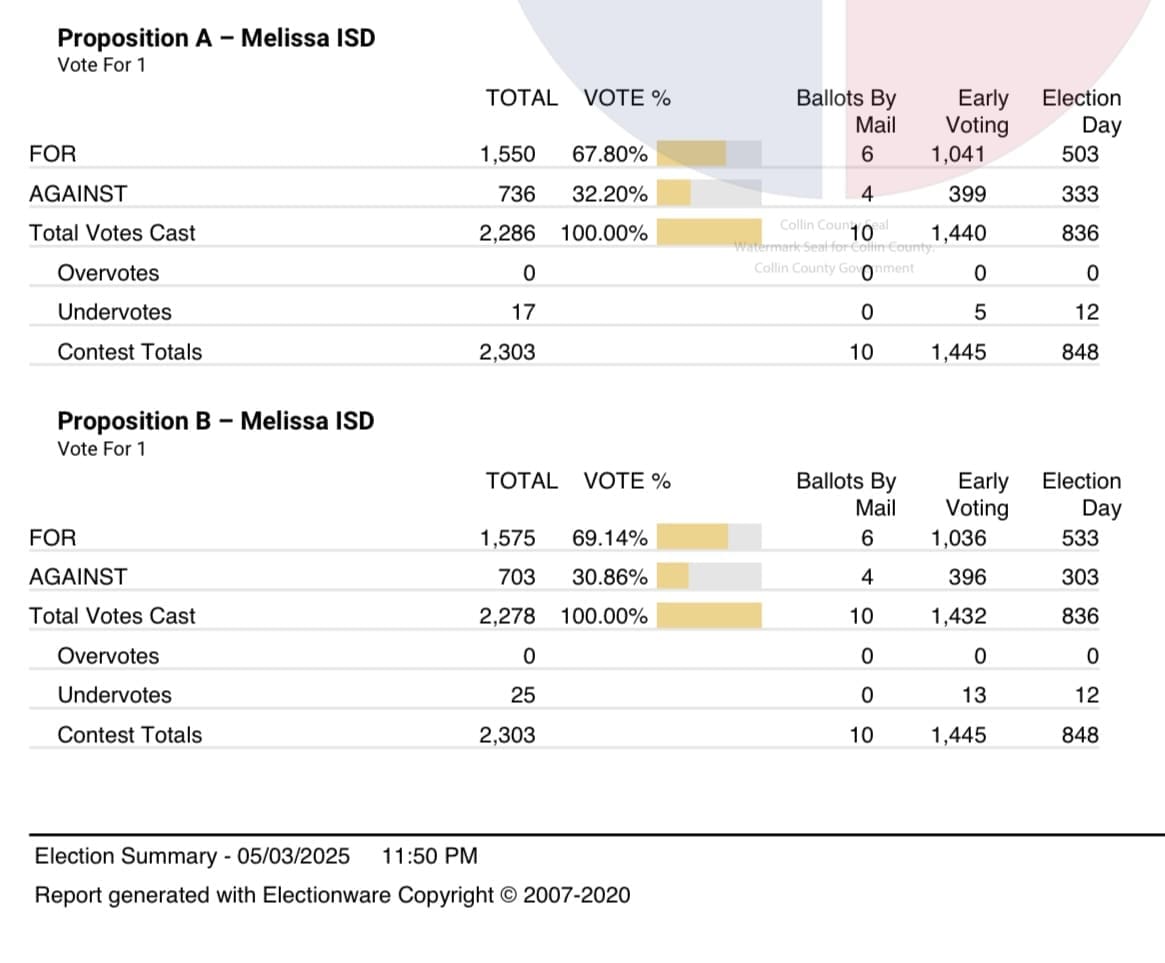(Texas Scorecard) – It was not surprising that the two Melissa ISD bond packages passed. Equally unsurprising was the number of votes cast and, even more, the small number of voters who successfully committed their fellow citizens to a large amount—$1.6 billion—of new debt, a functional tripling of current ISD debt.
Per numbers used in Melissa ISD’s Notice of Bond Election, an initially projected $1.2 billion total bond cost (including interest added to the principal-only, school-advertised $685 million) was revised to reflect the district’s stated amount of $1.6 billion. Though included in the February 3, 2025, notice, it does not appear the amount was widely, if at all, shared with taxpayers.
The Collin County Elections Administrator currently offers these unofficial election results:

In a town of approximately 23,000, only about 10 percent of residents—nearly 2,300—actually cast votes. And of that number, only 1,600, or 7 percent, voted to add $1.6 billion in new debt. And people think their votes don’t matter?
As discussed in an earlier article, the “quiet” nature of this election appears to have played out. Bond elections are not campaigns of transparency. The “honest broker” approach of government entities seeking taxpayer approval is also highly debatable.
The public education industry is highly influenced—some would argue completely controlled—by “professional” organizations such as the Texas Association of School Boards (TASB) and the Texas Association of School Administrators (TASA).
Schools use taxpayer dollars to fund memberships to these organizations, which function as a protectorate that lobbies and works on behalf of members (i.e., school districts, etc.) to seek and retain larger amounts of governmental control and taxpayer funds. These efforts often work against the best interests of taxpayers desiring a limited approach to government along with fiscal responsibility and a high degree of transparency.
Texas public education is a “monkey see, monkey do” institution. School districts and associated bond election proponents have historically used a formulaic approach that incorporates aggressive PAC-funded marketing campaigns, district presentations to the public, and basic peer pressure throughout the community. As new bond package approvals become more difficult to obtain, Melissa ISD’s alteration to the standard playbook appears to have worked.
One aspect of the standard approach, however, is likely still in play—that of ensuring eligible school district employees “understand their need to vote.” Typically one of an area’s largest employers, ISDs appear to have identified this tactic as yielding important leverage.
Per Texas Scorecard, this was even a presentation topic at txEDCON23, a 2023 TASB and TASA-hosted convention. Within an Igniting a Culture of Advocacy session, Prosper ISD’s Deputy Superintendent Jeff Crownover reportedly discussed how “the district is trying to get more district employees to vote.”
The article further reported:
He specifically referenced the “Culture of Voting” scheme that includes rewarding staff for voting, busing staff and students to polling places, and tracking which employees have and haven’t voted during bond elections.”
“Melissa ISD Quietly Seeks $1.2B Bond Approval” concluded:
While strictly an opinion, this one seems easy to predict. Both measures will pass with healthy majorities. Note that’s healthy majorities, not healthy vote totals. May elections, by design, are low-turnout affairs. The potential of high-dollar decisions made by small numbers of voters is a point not lost on any local government. And it should disturb fiscally responsible residents.
In reiterating how district employees often “understand their need to vote,” it was further predicted “that understanding will most likely quietly carry the day.”
If the truth were known, that likely is the case.


